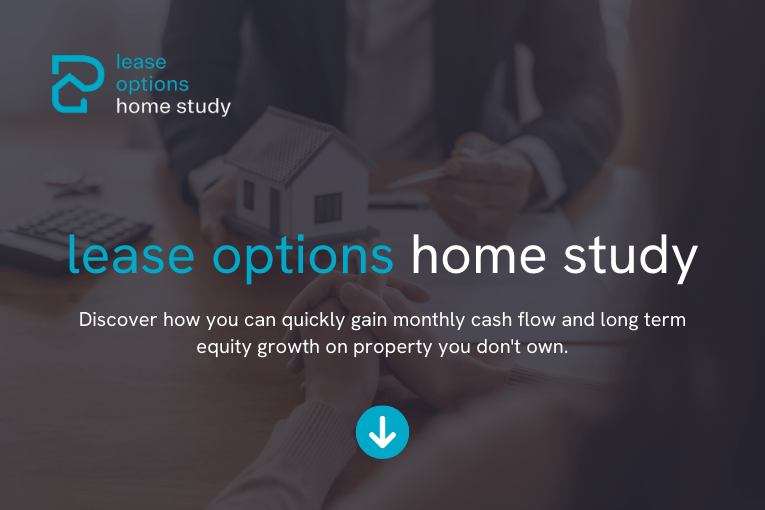
A 6-module online home study course, guiding you step-by-step to quickly generate monthly cash flow

Watch at your own pace, anytime, anywhere.
Instant online access.
Modules you will gain access to:
We’ve broken down our course into 6 very easy to follow modules, releasing them one week at a time.
This way, you can put your learnings into practice, as you go through with the Lease Options Home Study.
Introduction to PO’s & PLO’s
Acquire a knowledge of generating cash flow from properties you don’t own and the reasons that property owners agree to Lease Options.
Research
You will assess deal viability, learn more about maximising profitability, understand mortgage roles, evaluate deals with a checklist, and determine the value of Purchase Lease Options.
Find potential PO & PLO deals
Familiarise yourself with locating potential Option deals by building strong relationships with Estate Agents, reaching out to Motivated Landlords and networking with other landlords.
Dealing with property owners
Be taught all about engaging sellers with relevant questions, tailoring approaches, negotiating profitable agreements and crafting successful offers.
Different option strategies
Be taught all about engaging sellers with relevant questions, tailoring approaches, negotiating profitable agreements and crafting successful offers.
Complexities made simple
Understand Exchange Delayed Completion (EDC), higher Option fees, mortgages, buying entire property portfolios, Section 24, plus packaging and selling Options.
Frequently asked questions
What exactly Is a Lease Option?
A Lease Option, Purchase Lease Option (PLO), is a powerful tool that you can use to control an asset which you don’t own. You enter a contract with the owner of the asset, whereby you have the right to buy that asset (but not the obligation to buy) within a certain time period (Option Period) for a price that you set today (Option Price). There should be an Upfront Option Fee, usually £1, but it could be several thousand pounds. This Upfront Option Fee comes off the Option Price when (and if) you do actually purchase.
There is also a Monthly Option Fee which you pay to the owner in exchange for being able to use the asset. This monthly option fee may or may not come off the end price. It all depends on what you agree with the owner.
Finally, a Lease Option should be assignable so that if you don’t want to exercise your right to buy, you can assign this benefit to another person or company and potentially make an additional profit.
How can we find potential option deals?
There are many strategies you can use to find potential purchase option deals, including working with Estate Agents and Letting Agents, contacting landlords directly through letter campaigns, networking, and word of mouth. And all of these strategies are detailed in this Lease Options Home Study, including scripts of exactly what to say to estate agents and property owners.
Is this strategy suitable for new investors?
Yes, absolutely. Once you understand how to use Lease Options correctly, they are a very powerful tool which will help you quickly build up a cash generating property portfolio. If I lost everything and had to start my property journey from scratch, knowing what I know now, Lease Options is absolutely where I would start. However, you do need to learn how to use them correctly.
How do I, as the buyer / investor benefit from lease options?
The first benefit for you with a Lease Option, is that you get to try before you buy. You can rent the property out. Make sure you’re happy with it before you actually commit to the full purchase. This makes investing in property less risky, because you can avoid buying properties that might be a mistake.
The second benefit is that you don’t need to put down a large 25% deposit in order to start using the property. The investment to acquire a Lease Option could be as little as £1000 pounds (to cover the legal costs). However, typically, a Lease Option might require between £5k and £10k to cover all of the costs. This can be finance as a NO Money down deal. More on this later.
The next huge benefit is that you do not need to get a mortgage until you actually buy the property (if you do decide to buy it). This is great if you can’t get mortgages or have too many mortgages already.
leads on to the final benefit, which is that you could be making money from a Lease Option property very quickly. Typically, legal work might take three or four weeks, which is much quicker than an actual purchase of a property, which will probably take more like four months in the current market conditions.
How much support do I get with this home study programme?
Although you get to go through this training at home whenever it fits in with your schedule, you are not alone. The programme is split into six easy to consume online modules, one delivered each week so that you have time to watch the videos and work out any questions that you have. We want to help you take action to make the most of this Golden Opportunity. You also get access to our PLO Academy, which gives you 12 months of support via our private Facebook group and group coaching calls every month for a full year.
What if after joining this home study programme, I don’t think lease options are for me?
All investments have risks except this one. There are two ways this investment can go for you. Here’s the first scenario: You put these Lease option strategies and tactics to work and smash it by replacing your income in a short space of time. In that case you’re probably going to need a calculator to figure out what your return on investment is. The second scenario goes like this. You just don’t do anything with the material, or you get distracted, or it’s just not your thing. That’s OK. It happens. In this case, just take advantage of my 14-day free look policy, and just send me a note, and I’ll get you a refund asap. No questions, no hard feelings.
Is this strategy suitable for experienced investors?
Yes, as an experienced, I love Lease Options, because I can quickly control a property using very little of my own money, and without having to get a mortgage. Lease Options are versatile tools which can be used in conjunction with any property investing strategy, particularly those that might be favoured by more experienced property investors such as: Short Term Rentals, Houses of Multiple Occupation, Commercial to Residential conversion, Freehold Leasehold Title splits, etc. It’s amazing how many, even experienced investors, don’t really understand Lease Options otherwise they would have done at least one by now.
Can I use this to get rid of properties I no longer want?
If you have been investing in property for a while, you will probably have a few properties in your portfolio, which, if you were offered a second time, you probably wouldn’t buy again. You can use Lease Options to sell these properties at full market price, to people who can’t get mortgages right now, but would love to get their foot on the ladder. We call these people tenant buyers. This is a perfect win-win for you, and them. This is covered as one of the strategies in the Lease Options Home Study.
How can I get options deals through estate agents?
The first problem is that most estate agents have never heard of Lease Options. When the average investor attempts to explain how options work to the estate agent, they usually don’t do a very good job. If the estate agent thinks that they won’t get their commission for a few years, they will actively put the seller off the idea of accepting the option. This is why most investors believe that you can’t get options from estate agents. But that is not correct. If you know what to say, and say it in the correct way, you will find estate agents bringing potential option deals to you. That is why in this Lease Options Home Study, we give you the exact script to use when speaking to Estate Agents. Also, you get the different scripts to use when speaking to letting agents and the property owners themselves.
How can I do lease options when my solicitor does not understand them?
Most solicitors don’t know about Lease Options and so will either tell you they can’t be done or will charge you a fortune if they need to work out how to put the contracts together. Having the wrong solicitors can ruin your profitable option deal. It is really important that you use the right solicitors who know exactly how to put these option contracts together correctly to give you maximum protection. That’s why we have made one of the bonuses in this Lease Options Home Study, access to our panel of solicitors, who have done thousands of these transactions. This means they not only know exactly what to do, but they are also cost-effective, which will save you a fortune when using this strategy.
Can we only use lease options with landlords who are looking to retire early due to the section 24 tax changes?
No Lease Options can be used in many different circumstances. With regard to the Section 24 tax changes, options can’t help a landlord avoid the effects of Section 24. Instead, they can be used to help a landlord, who decides to retire early because of Section 24, to minimise the amount of capital gains tax that they have to pay when they sell their properties. You can take on their properties with an option, benefit from the cash flow and then buy the properties over a number of years from the landlord so that they can utilise their personal capital gains tax allowance each year. This will allow them to minimise the amount and Capital Gains Tax they have to pay. This means more cash in the landlord’s pocket and the ability to walk away and forget the properties, which is why Lease options work so well for retiring landlords and you.
Why would property owners agree to this?
This is a very important question. Many property investors just can’t get their head around why on earth an owner would enter into a Lease Option agreement. If you don’t understand this, you probably won’t be able to secure any Lease Options. If you can’t see the benefits the owner, it’s going to be very difficult for you to get the owner to agree. However, you need to put yourself in the shoes of that property owner. Usually they really don’t want the property anymore. They don’t want the hassle. They don’t want the responsibility so you’re coming in to solve a problem for them. What is someone else’s lead weight around their neck could be gold when you take it over and use the property in a different way. For example, someone might be renting out their property as a single let property, which just doesn’t stack up with the current higher interest rates. However, it might be possible to repurpose that property for a different use, such as Short Term Rentals, or as a House of Multiple Occupation (HMO) where the income is significantly higher than a Buy to Let. This means so you can actually pay that owner the full market rent for a single let, but use it in a different way and so make a profit. It’s all about understanding what is the problem for the owner.
Remember, if someone’s trying to sell a property because they want the equity now, a Lease Option is not going to work. However, if they don’t need their money now, but want to get away from the hassle and responsible of the property, then a Lease Option could be a perfect solution. A win-win for everyone involved.
How do you get the owner to agree to do a lease options?
In the Lease Options Home Study, you get scripts for you to use with property owners to help them understand how this can be a perfect solution for them. First of all, you need to understand the circumstance of the seller and make sure that Lease Options is an appropriate strategy for them. For example, it’s no good suggesting an option if the seller needs the money now from the sale of their property. However, if they don’t need the money now, and you can come up with an alternative solution that is better for them than selling the property right now, then it’s a win-win for everyone involved. You should never have to sell a Lease Option to anyone. It’s a case of merely understanding if this would be a good solution for them and presenting them with the facts, for them to decide if they would like to do a part of the solution or not.
Can you really buy a house for £1?
Often, when people think about Lease Options, they associate it with the expression of buying a house for a £1. This is not actually correct. You don’t get to buy the house for £1. You get to buy the contract for £1, that gives you the right to buy the house for the agreed price, which might be £200,000. For that £1 option fee, you have control over that asset for the duration of the option period. Often the option fee might be several thousand pounds, depending on the deal, and the circumstance of the seller. All of this is negotiable.
Do lease options work with all property deals?
Unfortunately not. This is a big mistake made be many investors when trying to use Lease Options. They try and use then when it’s not appropriate, then they think that Options don’t work. Lease Options can work in conjunction with every property investing strategy, in certain circumstances. There are two requirements we need to look for to determine if a Lease Option is an appropriate solution, or not.
The first requirement is the seller doesn’t need the money now from the sale of the property. Most sellers are selling because they want to access the equity in that property, therefore in most situations a Lease Option is probably not going to work. However, in a situation where a seller wants to get rid of a property, but they don’t really need the equity now or maybe there is no equity, then a Lease Option could work as long as the second requirement is met, which is favourable mortgage conditions.
Favourable mortgage conditions means if we’re taking on someone else’s property, either there’s no mortgage (about 25% of properties have no mortgage) or if there is a mortgage, ideally it is already; a buy to let mortgage; on a low interest rate; with a long period still to run.
If both of these criteria are met, i.e. the seller doesn’t need the money now, and there are favourable mortgage conditions, a Lease Option could be a great solution for the seller.
Does this work for commercial property and land?
If you are an experienced investor, and you’re looking to do larger projects, such as commercial to residential conversion, planning gain on plots of land, Purchase Options are the best ways of doing these strategies, because it will minimise your initial cash requirement and maximise your return on investment.
Does this strategy work anywhere in the world?
The principle of finding motivated sellers and coming up with an ethical Win-Win solution works everywhere, all around the world. However, there are a few places where currently, you can’t use Purchase Options. This includes Scotland, parts of America, and parts of Australia. In these locations, we can use alternatives such as an Exchange with Delayed Completion (EDC) which is similar to, but not quite the same as Purchase Options. There are some fundamental differences which are fully explained in the Lease Options Home Study.
Can I use this strategy to invest remotely?
Most of our students invest in the UK. However, we have some who don’t actually live in the UK and invest remotely. They do this by understanding the principles, making the most of social media and connecting with people on the ground at live events such as Strategy Implementation Live, and Property Magic Live. At these events, you can build a local power team of contacts, who can be your people on the ground, representing you, which means you can invest remotely using Purchase Options.
Can I use this in conjunction with other strategies such as SA or HMO’s?
Purchase Options are more of a tool than a strategy. They can actually be used in conjunction with the majority of the other strategies. Think of a Purchase Option as an alternative to buying the property. The property can then be used as it would normally as an HMO, Serviced Accommodation, or whatever you want it to be used for.
Can you do this in a company name?
We recommend it is best to set up a property company, in which you will put your options. This is for several reasons. First of all, if you decide you don’t want to keep the option and sell it on to someone else, you’ll pay corporation tax on the profit, instead of personal income tax. This will save you a lot of tax. Secondly, if you do want to buy the property, buying in a company structure is probably the best way to do it.
What happens if the property gets repossessed?
If a property gets repossessed because the mortgage is not being paid, then you will potentially lose your right to buy the property. It might be that the mortgage company will approach you and give you the first choice to buy the property, as long as the mortgage is less than your option price. However, it’s much easier to avoid this in the first place, by putting a clause into your contract, such that if the owner fails to make any mortgage payments to the mortgage company, you have the right to step in and make all future payments, direct to the mortgage company yourself, to make sure the property is not repossessed.
What happens if the property owner goes bankrupt?
If you were actually to purchase a property below market value and the owner goes bankrupt within five years, it is possible that the trustees would come back and turn over that sale, for which you would not be compensated. Therefore, there are risks in actually buying any property. It’s a similar situation with a purchase option. If the owner goes bankrupt, then, depending on the purchase price agreed, you may or may not be able to exercise your option, in which case you would have only have benefited from cash flow during the option period.
What happens if the property owner dies before the end of the option period?
You have a legally binding contract with the owner, which will pass on into their estate in the event of them dying. If there was a mortgage on the property, the mortgage company might require that the mortgage is paid back soon after death. This means that you may have to exercise the Option sooner than you wanted to, but obviously, you have the right to walk away if you don’t want to do that.
What happens at the end of the option period?
At the end of the option period there are 4 possible outcomes:
The first outcome is you exercise your right to purchase the property as planned, at the agreed Option Price, less any Initial Upfront Option Fee. This must be done before the end of the Option Period, otherwise you lose the right to buy.
The second outcome, is you assign the property onto someone else who ends up purchasing the property. You can make a profit here if the price you assign to the end buyer is higher than the Option Price agreed with the owner.
Third outcome, is you re-negotiate with the owner. The owner is not obliged to extend but if you’ve been looking after the property and they really don’t want it back and you’re unable to purchase at that time, then they might agree to extend the contract. As part of the negotiation you might agree to pay another Upfront Option Fee and/or you might pay a higher monthly Option Fee, but this is all negotiable.
And finally, you could walk away from the deal. Remember you have the right to buy, but not the obligation to do so. From an ethical point of view, if you enter into a Lease Option agreement, I believe you should have the intention to buy the property but, of course, circumstances can change over time. If you do hand a property back to the owner, you should make sure that it is in as good as or better than the condition when you first took it on.
Can I still do this if I have a poor credit rating?
This is a fantastic strategy if you have a poor credit rating and are unable to get mortgages, at the moment, because your personal credit rating has absolutely nothing to do with being able to get an option agreement. Of course, if you want to exercise the Option, you will need to be able to get mortgages before the end of the option period, but that will give you some time to repair your credit rating. Alternatively, if you are unable to get mortgages, you could joint venture with someone else, and put the property into their name and have co-ownership of that property, even though it’s not in your own name.
How much money is required to do an option?
One of the benefits of Lease Options is that they do not require the traditional 25% deposit. However, there are usually some costs involved, which cover the legal costs, maybe a fee to pay to a sourcing agent or to an estate agent, and usually a small amount of refurbishment work to get the property in a good rental state. This can vary from deal to deal, but typically it’s between £5k and £10k. This does not have to be your money, it could be borrowed from someone else, or in fact, you could do a joint venture (JV) on all of the purchases options you find if you do not have any of your own funds. Alternatively, if you don’t want to do a JV with anyone, in the Lease Options Home Study, we provide you with the details of a commercial lender who will lend money to your property business to cover these small £5k to £10k costs of doing options. The interest and capital can be paid back over a number of years from the property cash flow which means that this can be done using none of your own money.
Why Is now the perfect time for this strategy?
There are more and more landlords looking to dispose of their properties than ever before. This is because of increased taxation due to Section 24; Rising interest rates reducing monthly cash flow; and changing legislation such as the requirement for EPCs to be a minimum of a C rating by 2025. This means that many landlords are becoming more frustrated and deciding to sell up, particularly since they’ve had incredible capital growth over the last 12 years. These landlords are not necessarily selling to get access to the equity but rather they don’t want the responsibility or hassle of the property any more. In other words they could be perfect for a Lease Option. I predict that this year is going to be one of the best years ever to secure Lease Options. You upskill your knowledge about Lease Options to make the most of this.
Who looks after the property?
One of the benefits of a Lease Option for the property owner, is that you take on the full responsibility for looking after their property. You look after all the maintenance, the bills and maybe even pay for the insurance. Personally, I would get the owner to take out the insurance policy, to make sure it’s fully adequate, however you might offer to pay for this as part of the deal.
Who should insure the property?
It is in the owner’s interest to have insurance on the property, but it is also in your interest because you have the right to purchase the property at some point in the future. For this reason, it can be wise for both you and the owner to be listed as interested parties. You can offer to pay for the property insurance as part of the deal with the seller and make sure you use a property specialist Insurance broker who understands how the property is being used to make sure you have the correct insurance cover in place.
What do mortgage companies think of options?
Mortgage companies do not know what Lease Options are, so you would never say to a mortgage company that you are doing an option because they would not understand. However, you need to make sure you do things correctly and are not doing anything that would breach the mortgage terms and conditions. For example, if you are doing an option on a residential property, the owner would need to get “consent to let’ from the mortgage lender so that you could rent out the property. How to deal with mortgage companies is covered in the Lease Options Home Study.
What happens if the owner changes their mind and doesn't want to sell the property?
If a property significantly increases in value during the Option Period, you can imagine that some owners might be reluctant to sell at the agree Option Price. However, you must remember they’ve entered a legal contract and as long as the contracts have been put together correctly and both seller and buyer have had independent legal advice, then there’s very little that an owner can do about it. They have to sell to you at the agreed Option Price. When your solicitor puts together the Lease Option agreement, they should also put a Power of Attorney in place, so that you can execute the purchase at any time, within the Option Period, without having to track down the owner and get them to sign the sale agreement.
Can lease options be no money down?
Although you don’t require a 25% deposit, there is normally some money required to acquire a Lease Option. The minimum might be £1000, but typically a Lease Option with all the costs might be somewhere between £5k to £10k. These costs could include: fee to a sourcing agents, fee to an estate agent, the legal costs for you (and potentially the seller), light refurb costs on the property, new furniture etc.
However, there are commercial lenders who will lend to property businesses on an unsecured basis, to cover all of these costs. This means, if you have a property company, and the deal is good enough, you can actually borrow all of the money to do a Lease Option. You can pay this loan back (plus interest) from the property monthly cash flow, over a three year period, which means Lease Options, in the right circumstances can be done with no money your pocket, a true no money down method.
What Is the difference between rent to rent and lease options?
Rent to Rent (R2R) is very similar to Lease Options, in that you find someone who’s got a property they don’t really want. You take on full responsibility for the property. You pay a guaranteed rent to the landlord each month. You then rent the property out in a more profitable way than the owner and make a margin on the difference between what you pay the owner and the higher amount you charge the tenants. This is exactly what you do with a Lease Option but with Rent to Rent, you don’t have the right to buy the property. That means you don’t benefit from any potential capital growth. At the end of the Rent to Rent term, you give the property back to the owner, who might agree to an extension of the contract, for a few more years, but ultimately the owner gets their property back at some point. With a Lease Option, remember you have the right to buy the property (if you want to) and so you can benefit from potential value increase over the Option Period.
For this reason, on a Rent to Rent deal, we want to aim for a 100% return on investment. That means any initial capital that’s put into the property, we get back in rental income within the first year. With a Lease Option, because we have the right to buy the property in the future (if we want) we are prepared to put more money into that property and might be happy with just a 50% Return on Investment, i.e any money we’ve had to put in to acquire the option should come back within a two-year period. This means we might be able to do some deals that would not really work as Rent to Rent but might work as a Lease Option because we’re happy with a lower return on investment. 50% is still very good.


100% Risk-Free Guarantee
We're confident you'll get so much value from this home study that we're offering a 100% Risk-Free Money-Back Guarantee.
If, for any reason, you decide within 14 days that this isn't right for you, simply let us know, and we'll refund the entire amount you paid. After the 14-day period, refunds will no longer be available.
This training is officially accredited by the CPD Certification Service, giving you the confidence that it meets industry-recognised standards for learning and development. On completion, you’ll receive a CPD certificate confirming your achievement and hours earned.

Meet Your Trainer: Simon Zutshi
Simon Zutshi, is a financially independent, professional property investor, best-selling author and widely recognised as the top wealth creation strategists in the UK. Having started to invest in 1995, he became financially independent by the age of 32.
Passionate about sharing his experience, Simon founded the property investor’s network in 2003 which has grown to become the largest property networking organisation in the UK, with monthly meetings in 50+ cities, designed specifically to provide a supportive, educational and inspirational environment for people like you to network with and learn from other successful investors.
Since 2003 Simon has taught thousands of entrepreneurs and business owners how to successfully invest in a tax efficient way to create additional streams of income, give them more time to do the things they want to do and build their long-term wealth.



